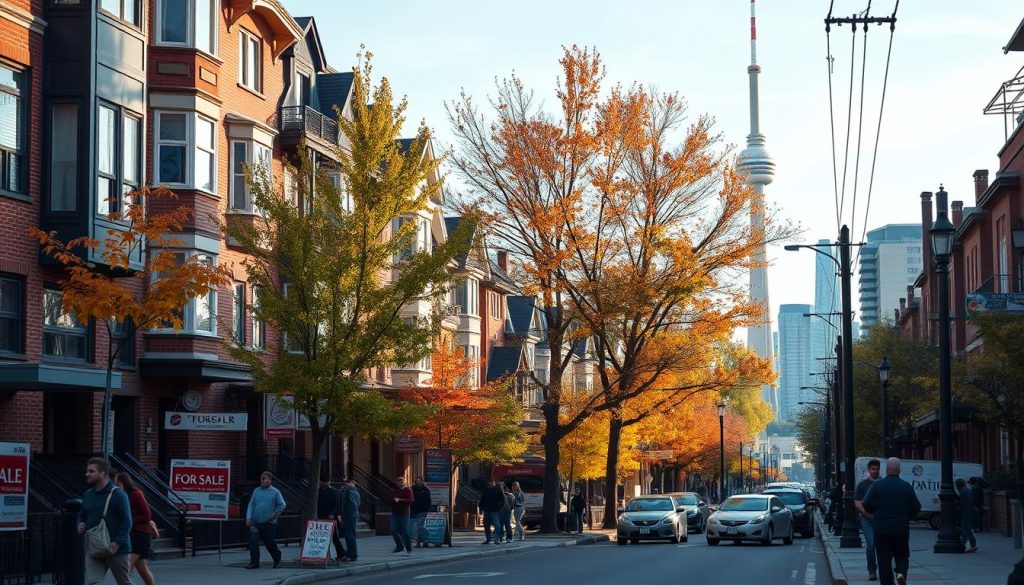Starting your journey to homeownership is a big deal. I’ve been through it myself and learned a lot. Now, I want to share what I’ve learned with you. This guide is here to help you understand the home buying process.
It will give you tips and advice every step of the way. Whether you’re checking your budget or looking at mortgage payments, knowing what to do is key. It will help you get the keys to your new home.
Key Takeaways
- Understand the financial commitments: a down payment of 5% is typically required for homes under $500,000 in Canada.
- Mortgage loan insurance must be considered by buyers with less than a 20% down payment.
- Negotiations determine the deposit amount, usually around 5% of the home’s purchase price, due shortly after contract signing.
- Allocate 1.5% to 4% of the purchase price for closing costs in Canada.
- Maximize your savings with the First Home Savings Account, allowing for tax-preferential saving towards your down payment.
- Withdraw up to $60,000 from your RRSP via the Home Buyer’s Plan without immediate tax penalties.
- Claim the Home Buyers’ Tax Credit to receive up to a $1,500 rebate for a recent home purchase.
Understanding the Home Buying Process

The journey to owning a home in Canada starts long before you see a house. First, you need to check your financial health and learn about mortgage advice. This helps make buying a home easier. We’ll look at budgeting, getting a mortgage, and the Canadian real estate market, especially in Toronto.
Assessing Your Financial Health
Before you start looking, know your financial situation. Compare your income and expenses to see what you can afford. Make sure your debt-to-income ratio is not too high. A good credit score helps you get better mortgage deals.
Evaluating Mortgage Advice
Getting a mortgage is a big step. The mortgage pre-approval process checks your finances. It shows how much you can spend and makes you a stronger buyer in Toronto. Working with a mortgage broker can help you find the best deal.
Considerations for the Canadian Market
The Canadian real estate market is unique. Places like Toronto have limited space, which raises property prices. Keep an eye on the market to find the right time to buy. Waiting too long might not be the best strategy.
In conclusion, knowing the financial and market details is key to buying a home. Being prepared helps you navigate the real estate world, especially in places like Ontario and Quebec. Here’s a table with important financial and market information for homebuyers:
| Category | Detail | Ontario | Quebec |
|---|---|---|---|
| Average Home Price | 2024 | $884,761 | $475,100 |
| First-Time Buyer Incentives | Tax Credits, Down Payment Assistance | Up to $8,475 in tax refunds | Varies based on property price |
| Home Buyers’ Plan (RRSP Withdrawal) | Maximum Amount | $35,000 | $35,000 |
| Mortgage Pre-Approval Requirement | Credit Score | Above 660 | Above 660 |
With this information, homebuyers can prepare better. They can confidently enter the markets of Ontario and Quebec.
Tips for First-Time Home Buyers
Starting your journey to homeownership is exciting but can feel overwhelming. It’s important to grasp the financial aspects and use smart house hunting strategies. Here are some key real estate tips to keep in mind:
- Assess Your Financial Readiness: First, check your credit score. It should be around 680 for most mortgages. Use tools like Scotiabank’s “What Can I Afford?” calculator to see what you might qualify for.
- Understand the Total Costs: Your monthly costs aren’t just the mortgage. You also need to think about property taxes, home insurance, and maintenance. These can cost 2% to 5% of your home’s value each year.
- Explore Mortgage Options: Look at different mortgage terms, from three to five years. Compare lenders based on prepayment options, term flexibility, and interest rates. Keep in mind, a down payment under 20% means you’ll pay extra for mortgage insurance.
Financial Benefits for First-Time Buyers
| Program | Benefits | Eligibility |
|---|---|---|
| Home Buyers’ Plan (HBP) | Withdraw up to $60,000 from RRSPs for a down payment. | Must be a first-time homebuyer and a Canadian resident. |
| First Home Savings Account (FHSA) | Make annual tax-deductible contributions up to $8,000. | Canadian resident, 18 years or older, and a first-time homebuyer. |
| Tax-Free First Home Savings Account (FHSA) | Up to $40,000 in tax-deductible contributions. | Must be 18 years or older and a first-time homebuyer in Canada. |
To succeed in the real estate world, be well-informed and seek advice tailored to you. Be ready for any challenges by knowing all the fees and legal steps involved. Buying your first home is a big deal. With the right approach, it can be a very rewarding experience.
Finding the Right Real Estate Agent
Buying your first home is exciting but also complex, especially in the busy Toronto market. It’s important to value real estate agent expertise and Toronto market experience for a smooth transaction. When choosing an agent, consider several key factors that impact your home buying journey.
Seeking Genuine Expertise Over Family Favors
It’s tempting to use a family friend or relative in real estate. But, it’s crucial to choose someone with professional skills and experience, especially in competitive markets. An agent’s knowledge and ability to navigate the market can make a big difference in finding your dream home.
Necessity of Communication and Responsiveness
A good agent is known for their agent communication and responsiveness in home buying. You need someone who communicates well and answers your questions quickly. They should help you understand every step, from getting a mortgage to closing the deal.
The Importance of Agent Education on the Market
An agent who knows the local real estate market well is key. They can guide you through market changes and opportunities. Their role as both teacher and advocate is invaluable, especially when making a big financial decision.
The table below shows important factors to consider when choosing a real estate agent:
| Aspect | Detail | Impact on Home Buyer |
|---|---|---|
| Commission Structure | Typically 5%, potentially split with buyer’s agent | Influences agent motivation and cooperation level |
| Educational Requirement | Continuous, includes ethical training | Ensures informed and up-to-date advice |
| License Experience | Varies by province, e.g., 2+ years in BC for brokers | Enhances market knowledge, negotiating skills |
| Dual Agency Disclosure | Must be disclosed, not permitted in all areas | Affects objectivity, potentially divides loyalties |
| Reputation | Derived from client testimonials, online reviews | Provides insight into reliability and success rates |
With this knowledge, focus on finding an agent who can educate, communicate, and guide you through the Toronto housing market.
Navigating the Mortgage Maze
Starting your journey to owning a home means entering a complex world. You’ll hear about mortgage pre-approval and working with a mortgage broker. It’s important to understand these terms to move through the mortgage maze successfully.
Getting a mortgage pre-approval was a big step for me. It showed me how much I could spend and proved to sellers that I was serious. Working with a mortgage broker was key. Their knowledge helped me get through the mortgage process easily.
Let’s look at some key numbers:
| Criteria | Standard | Advice |
|---|---|---|
| Credit Score | 620 or higher | Higher scores get better rates |
| Debt-to-Income Ratio | Below 43% | Lower ratios help get loans |
| Down Payment for Conventional Loans | At least 20% | Avoids Mortgage Insurance |
| Maximum Affordable Monthly Mortgage | Not exceed 28% of income | Keeps finances stable |
Getting a mortgage pre-approval can seem tough. But, having a strong mortgage broker partnership makes it easier. Brokers know a lot and can find the best deals for you. They help make sense of all the mortgage options and rates.
Every step in the mortgage process matters. From checking your debt-to-income ratio to understanding down payments, it all affects your finances. Working with a mortgage broker can help you make the best choices and reach your dream home.
If you have questions or need help, call 343-888-8913 or email ebook@ottawa.law. They can offer personalized advice and even give you a free e-book on navigating the mortgage maze.
Being ready for a mortgage is more than just numbers. It’s about being ready to invest in your future with confidence. Let’s move forward with wisdom and turn challenges into steps towards owning our homes.
Deciphering Buyer Representation Agreements
As a first-time home buyer, it’s key to grasp Buyer Representation Agreements (BRA). They’re not just a formality; they protect you in the complex world of real estate. These agreements mark your first step into the real estate world, setting up a formal bond with your agent.
Understanding Exclusivity and Agent Commitment
The exclusivity clause in the BRA caught my eye. It means your agent focuses only on you, strengthening your real estate partnership. This is crucial because it stops conflicts of interest and makes sure your agent’s goals match yours.
Reading the Fine Print
Exploring the BRA terms reveals important details. You’ll find clauses on agreement length, usually 90 days but can be longer. It’s vital to understand each part before committing. This way, you know what you’re agreeing to and the conditions for leaving the agreement.
Here’s a table summarizing the key aspects of a typical Buyer Representation Agreement:
| Aspect | Description | Benefits | Risks |
|---|---|---|---|
| Duration | Typically 90 days, extendable | Ensures dedicated service | Limited flexibility |
| Cancellation | Possible by mutual consent or specific clauses | Flexibility to exit | Possible penalties |
| Exclusivity | Agent works only for you | Undivided attention | Restricted to one agent’s listings and network |
| Potential Costs | Defined in terms, may include commission to agent | Clear financial expectations | Costs accrue even if no purchase is made |
The BRA’s complex layers can seem overwhelming at first. But, they aim to create a fair and balanced relationship between you and your agent. Take the time to discuss each part of the agreement to make it fit your real estate journey.
Mastering House Hunting Strategies
When you’re in the game of competitive house hunting in Toronto, you need strong Toronto property search strategies. The real estate scene in popular areas is fast-paced and requires quick thinking. Planning well helps you stay ahead and make quick decisions.
Strategizing Your Search in Competitive Markets
In Toronto, house hunting is more than just looking for a home. It’s about understanding the market trends and property values. Tools like Comparative Market Analysis help you know what to expect in terms of prices.
Considering Long-Term Investment Value
Thinking of a home as an investment is key in Toronto. The market here is always in demand. Look at the location, future plans, and community amenities to see how they might affect the resale value.
Here are some important facts to keep in mind when buying a property in Toronto:
| Consideration | Insight |
|---|---|
| Down Payment | Ideally 20% to avoid extra insurance costs, though as low as 3% may be acceptable. |
| Closing Costs | Typically range from 1.5% to 3% of the purchase price. |
| Mortgage Pre-approval | Essential for being taken seriously by sellers, can take up to 10 business days. |
| Real Estate Agent Experience | Preferably 3-5 years within the local market, with accreditations like ABR. |
| Investment Potential | Consider property trends and future developments in the area. |
| Community Amenities | Parks, schools, and shopping centers add to a property’s real estate long-term value. |
Looking at both the immediate appeal and the home as investment potential is wise. It helps you find the right balance in Toronto’s competitive market.
Grasping Real Estate Trends
As a potential homebuyer today, knowing the real estate trends and market timing is key. The Toronto market, in particular, has its own set of challenges. You need to act quickly and make informed decisions.
The current market shows a shift in who buys their first home. Now, people in their late 20s to early 40s are more likely to buy. This change is important because it affects how much people want to buy and how they behave in the market.
- Market Forecast: Prices are expected to keep going up. So, timing is everything if you’re thinking of buying.
- Economic Momentum: When the economy grows, people feel more confident. This can lead to more demand for homes.
- Supply vs. Demand: It’s important to balance the number of homes available with how many people want them. Making more multi-family homes could help first-time buyers.
The Canadian Mortgage and Housing Corporation has stopped the first-time homebuyer’s incentive. But, they still offer other help like the First Home Savings Account. Knowing about these benefits can help with the cost of buying a home.
- Understanding financial incentives is important for buying at the right time.
- Studies show many first-time buyers use family loans. This shows a trend towards shared ownership and planning.
It’s crucial to keep up with trends and how they affect your area. Watch for policy changes, economic shifts, and demographic trends. Each of these helps you understand the real estate market better. This is important for making a smart investment in your future home.
Managing Budgeting for a Home
Starting my journey to homeownership means being smart with my money, especially for the down payment. The median home price in Canada is $412,300 as of 2024. Saving for a big down payment is essential. Luckily, Canada has programs to help first-time buyers like me.
Reaching a 20% down payment can lead to better mortgage terms. It also means avoiding extra costs like Private Mortgage Insurance (PMI). This can save me up to 1% on my monthly payments.
Down Payment Strategies
Lenders want at least 20% of the home’s price for a down payment. That’s $82,460 for a median-priced home. I’m exploring government programs to help with this.
The Federal Housing Administration (FHA) offers loans with just 3.5% down payments. But, following the 28% rule for mortgage payments is safer for my finances.
Calculating the Hidden Costs: Closing Costs Explained
But the down payment isn’t the only challenge. Closing costs can be 3% to 6% of the home’s price. This includes legal fees, land transfer taxes, and more. For a $412,300 home, I could face up to $24,738 in costs.
By planning for these costs, I’m setting myself up for success. This way, I avoid being “house rich but cash poor.”




